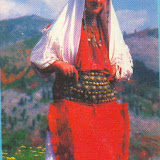John Kukuzelis
Saint John Kukuzelis (Bulgarian: Йоан Кукузел, Yoan Kukuzel; Albanian: Jan Kukuzeli) (c. 1280–1360) was a medieval composer, singer and reformer of Eastern Orthodox church music.
Kukuzelis was born in the city of Durrës (Drach) on the Adriatic coast of modern Albania in the late 13th century to a Bulgarian mother, his father dying at an early age. Kukuzelis received his education in the Constantinople court vocal school and established himself as one of the leading authorities in his field during the time. A favourite of the Byzantine emperor and a principal choir chanter, he moved to Mount Athos and led a monastic way of life in the Great Lavra. Because of his singing abilities, he was called the Angel-voiced.
Kukuzelis introduced the melodious (callophone) style and repertoir and created the Late Byzantine system of notation named after him. About 90 of his works in all church styles have survived until today, possibly the most famous one being the Chandelier of the Bulgarian Woman dedicated to his mother that, according to some researchers, contains elements of traditional Bulgarian mourning songs.
He was also the author of a new type of vocal collections and of the Hyronomic vocal exercise that offered 60 designations of vocal signs that marked melodic formulae key to the composing.
Kukuzelis is regarded as the most influential figure in the music of his period. He was later recognized as a saint by the Eastern Orthodox Church, his holiday being on 1 October. Although his ethnicity is only defined by that of his mother (a Bulgarian), he is also claimed by Albanians due to his place of birth, and Macedonians.
His last name is derived from the Greek words for beans and cabbage.
The Greeks also maintain the tradition that his family name was actually Papadopoulos, and not Kukuzelis, which he acquired later on as a descriptor. It is ofter said that a Kukuzelis is one who trades in pulses (i.e.: from the greek words κουκιά (koukia=beans) and ζέλια (zelia=peas).
Kukuzelis was born in the city of Durrës (Drach) on the Adriatic coast of modern Albania in the late 13th century to a Bulgarian mother, his father dying at an early age. Kukuzelis received his education in the Constantinople court vocal school and established himself as one of the leading authorities in his field during the time. A favourite of the Byzantine emperor and a principal choir chanter, he moved to Mount Athos and led a monastic way of life in the Great Lavra. Because of his singing abilities, he was called the Angel-voiced.
Kukuzelis introduced the melodious (callophone) style and repertoir and created the Late Byzantine system of notation named after him. About 90 of his works in all church styles have survived until today, possibly the most famous one being the Chandelier of the Bulgarian Woman dedicated to his mother that, according to some researchers, contains elements of traditional Bulgarian mourning songs.
He was also the author of a new type of vocal collections and of the Hyronomic vocal exercise that offered 60 designations of vocal signs that marked melodic formulae key to the composing.
Kukuzelis is regarded as the most influential figure in the music of his period. He was later recognized as a saint by the Eastern Orthodox Church, his holiday being on 1 October. Although his ethnicity is only defined by that of his mother (a Bulgarian), he is also claimed by Albanians due to his place of birth, and Macedonians.
His last name is derived from the Greek words for beans and cabbage.
The Greeks also maintain the tradition that his family name was actually Papadopoulos, and not Kukuzelis, which he acquired later on as a descriptor. It is ofter said that a Kukuzelis is one who trades in pulses (i.e.: from the greek words κουκιά (koukia=beans) and ζέλια (zelia=peas).






Няма коментари:
Публикуване на коментар